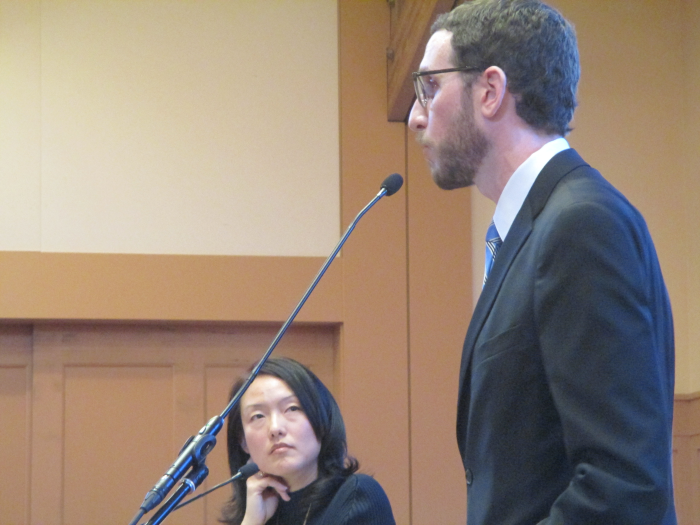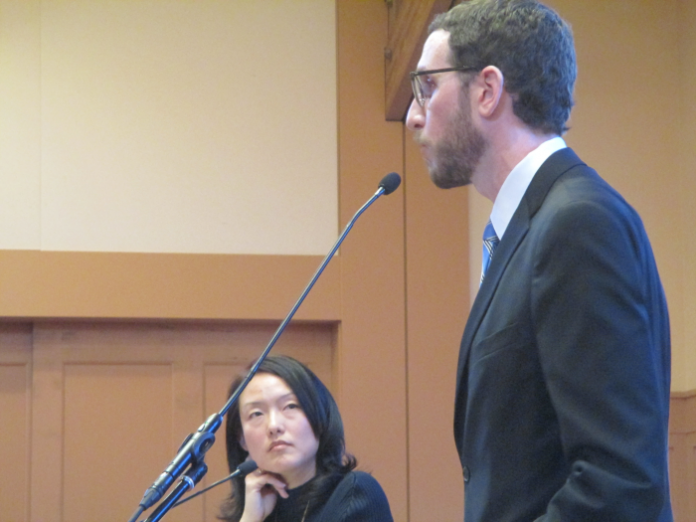The first of a series of debates between Sups. Scott Wiener and Jane Kim, who are both seeking a state Senate seat, set the tone for the race last night, with some sharp difference on policy issues and a few sharp elbows.
While the clashes were mostly civil, it’s clear that neither of these candidates is planning to back off from criticizing the other.

And the essential message came from Kim at the end: “There are plenty of moderate Democrats in Sacramento,” she said. “The last thing San Francisco should do is send another moderate to the Legislature.”
Wiener started off by portraying himself, as moderates often do, as the person who can “get things done.” He talked about his supporters, including “our great Senator Dianne Feinstein.” He repeated what he considers one of his greatest accomplishments: “Dispelling the myth that that you can build affordable housing without building more housing.”
Kim talked about how San Francisco has always been a city of refuge, a place for people who are different, who have been forced to leave their families, who wanted a chance to live their lives in a supportive world. “But people can’t afford to come to a city of refuge anymore.”
Now, she said, the city is for nobody but the ultra-rich: “The only ones who can afford to come to this city are those of extraordinary wealth.” She said that her message to developers is “if we as a city confer wealth on our land, you need to contribute.”
They clashed a little around donations, which will see again: Kim said that Wiener had taken maximum contributions from a guy who wants abolish rent control in California, and Wiener said that most of Kim’s money was from outside of the district.
But they also spoke of some serious differences in policy, and beyond the rhetoric and the applauding (both camps were well, and about equally, represented), you could see what this election is really about.
Kim talked about the prison-industrial complex, how she voted against building a new jail in San Francisco, and how “locking people up is not an answer to social ills.” She noted that over the past 30 years, the amount of money the state spends on prison went from 3 percent to 9 percent of the budget, while the amount that goes to higher education fell by about the same proportion.
She called for free community college education, and said she would pay for it by cutting spending on prisons.
Wiener agreed that the state needs to spend more on higher education, which was “the backbone of California’s success.” But, he said, “somehow the state lost its way.”
Not to make too much of that comment – in a 90-minute debate in a crowded room on a sweltering night, not everyone is going to get everything right. But “somehow” is the wrong point – the state lost its way because of clear decisions by people in power, including in the state Legislature, who decided that prisons (among other things like keeping taxes on the rich low) were more important than funding higher education.
He also said: “Let’s be real here, we do have a crime problem in this city, we do need to enforce the law, and there are people who should be away from society. So let’s not go to the other extreme.”
That was a classic moment: Wiener didn’t, and doesn’t, want to go to what he calls “the extreme.” He is running as he has always run, as someone who wants to make more modest, incremental change.
Kim is actually not a radical leftist; she supported the Twitter tax break, and there’s been more development in her district than anywhere else in the city. But she is talking about pushing a progressive agenda that doesn’t start with the same level of compromise.
There was a lot of talk about homelessness, and again some very clear differences. Kim supports the Right to Rest Law, and Wiener opposes it. Wiener said that law would prevent San Francisco from removing tent cities from public spaces; Kim said that until there are adequate shelter beds and paths to affordable housing, it’s inhuman to sweep people off the streets.
Kim said she opposes giving Tasers to police officers, and spoke strongly about police abuse: “When the police kill someone, it’s murder funded by us,” she said, asking that officers get the training they need “not to pull the trigger.”
Wiener said it was time to stop “demonizing police officers” and said that under very limited circumstances, he would support arming them with Tasers.
There was a pretty clear and dramatic exchange – similar to what we heard at the Board of Supes – over the Google buses. In response to a question from the audience, Kim said she didn’t think that private shuttles should be able to use the public right of way. “If you are a parent and pull into a bus stop to drop your child at school because there’s no place to park, you get a $300 ticket,” she said. “If you are a tech shuttle, you pay $3.”
She said she doesn’t oppose the shuttles, but said they ought to be staging in hubs, and that the workers can ride Muni (like the rest of us) to those hubs and get their shuttles down the Peninsula. “We should be a city for everyone,” she said. “We don’t have to give away everything just because people are creating jobs.”
Wiener said that forcing the shuttles into hubs would end the value of the program, since the tech workers wouldn’t want to take a Muni bus (like so many others do) to a staging area. It would, he said, drive people back into their cars.
I wonder about this: The tech companies love the shuttles because the employees are working as they commute. The wifi-enabled luxury coaches add hundreds of productive hours every day. If people had to drive, they would be unable to do that work. If they had to take a bus for 15 minutes then ride the shuttle, and work the rest of the commute, would they all drive (and fight traffic, with no ability to work) instead? Doesn’t seem as likely.
The two have very different views on housing. Kim supported Prop. F, the Mission Moratorium; Wiener opposed it. Wiener made it clear that he thinks the key to the crisis is building a lot more housing, of all sorts; Kim wants more housing only when the developers contribute a high percentage of affordable units.
Kim ended with a fascinating proposal that I didn’t know about: She said she’s going to introduce a luxury housing tax for the November ballot that would bring in $32 million a year.
So we are starting to see this campaign emerge. The June primary is only round one, and both of the candidates know it. In the fall, Kim will say that San Francisco needs to send someone to Sacramento who will push the envelope and lead the way on progressive issues. Wiener will say that moderates get things done.
And if last night was any indication, the two will not hesitate to mix it up.





